#high chancellor flavia
Explore tagged Tumblr posts
Text
Never forget that the Doctor's aunt, High Chancellor Flavia, was named Acting President by the Doctor, who wanted to run away from his own Lord President duties.
She adopted an intelligent cat as an advisor while Acting President. She named this Gallifreyan cat....the Doctor.
So notorious little shit of the family, Time Lord Renegade "the Doctor," ran away from Gallifrey, dumping all of his responsibilities on his aunt, and she responded by replacing him with a pet cat.
#i love this family#its so dysfunctional#doctor who#dw#dr who#classic who#flavia#the doctor#fifth doctor#5th doctor#5#the five doctors#high chancellor flavia#cats#gallifrey#lord president#lungbarrow family drama#family drama
268 notes
·
View notes
Text
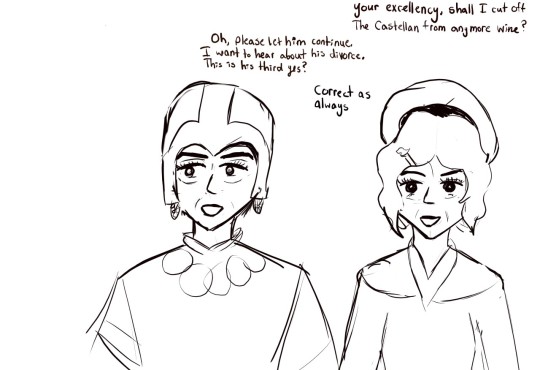
Sketch of President Borusa and Chancellor Flavia being shady because they are shady.
#they are the gay lesbian alliance#classic doctor who#Borusa#Chancellor Flavia#President Borusa#The Five Doctors#Timelords#High Council Of Gallifrey#High Council#doctor who
5 notes
·
View notes
Text
The Five Doctors (well, three and a half plus one, but who's counting?) Conclusion
[All images are owned by the BBC. Please don’t sue or EXTERMINATE! me]
youtube
(Thanks to Doctor Who)
This episode was originall aired in 4 parts. Part one of this review covered the first two parts (confused yet?)
PREVIOUSLY ON…
The first five incarnations of the Doctor, along with his current companions Tegan and Turlough as well as the Doctor’s granddaughter Susan, Brigadier Lethbridge-Stewart (retired), Sarah Jane Smith, and Lady Romana, have been plucked from the time stream by a device known as the Time Scoop and deposited on the Doctor’s home planet of Gallifrey in a region known as the Death Zone (except the fourth incarnation and Romana, who are trapped in a time vortex) Also in the Death Zone are Daleks and Cybermen, who appear to be pursuing the Doctor.
The High Council of Gallifrey has recruited the Master to enter the Death Zone and help the Doctor escape. Unfortunately, before he could convince the Doctor of his intentions, the Master was captured by the Cybermen and the Doctor used the Master’s recall device to teleport to the Council chambers.
The incantations of the Doctor are working their way to the Dark Tower in the center of the Death Zone, which houses the Tomb of Rassilon, the greatest of all of the Time Lords. Meanwhile, the Cybermen have discovered the TARDIS and are preparing to do something to it while Susan and Turlough are inside.
Now, on to the conclusion, which begins with Part 3. If you would like to watch the story, it’s available on BritBox or Tubi.
For now, let’s check in with the Doctor and the Brigadier as they attempt to enter the Tower…
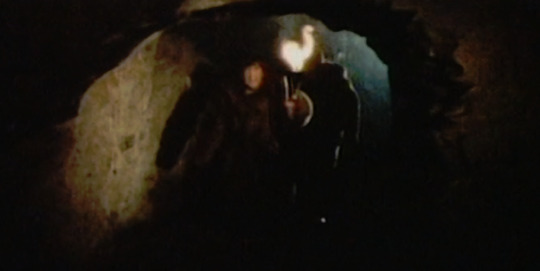
…from underneath. Meanwhile, the Doctor and Sarah attempt to enter the Tower…
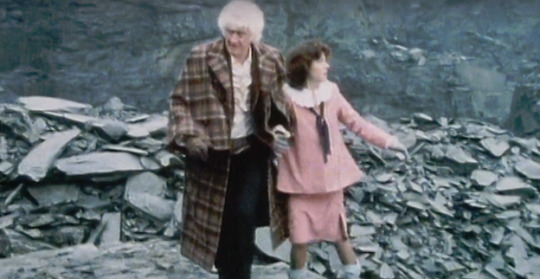
…from the BBC Quarry front entrance. However, they encounter…

The Doctor explains how dangerous the robot is to the audience Sarah as the robot toys with them.
Meanwhile, the Doctor and Tegan are also approaching the tower.
And inside the High Council chambers, the guards have searched the Castillan’s chambers and found…
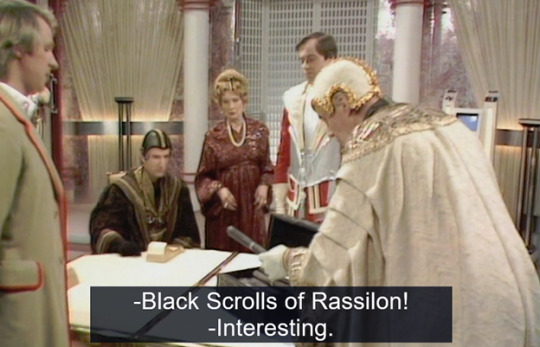
The President arrests the Castellan under suspicion of treason and mucking about with Forbidden Knowledge. Unfortunately, he was shot while attempting to flee (so? He’s a Time Lord. He’ll regenerate!)

(again, what’s to stop the Castellan from regenerating?)
The Doctor realizes he needs to return to the Death Zone and assist himself (and give an engraved apology to the Master)
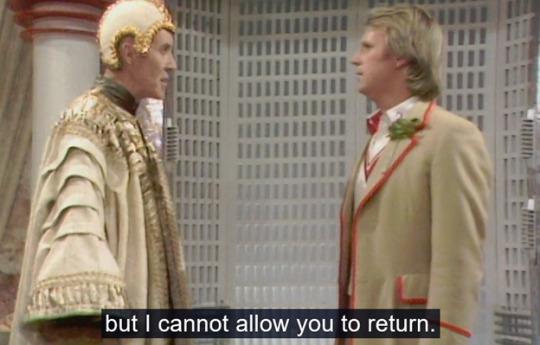
President Barusa wants the Doctor’s help uncovering what other mischief the Castellan was up to (isn’t that what the guard is for?)
Inside the cavern below the Dark Tower, the Doctor and the Brigadier are getting ever closer to the Tower as something is following them.

The creature traps them in an alcove it can’t get through, so the Doctor tries for a Hail Mary play by throwing fireworks at it. Fortunately, it actually works and the creature flees.

…or not. The creature digs at them furiously until the entrance collapses, trapping them.
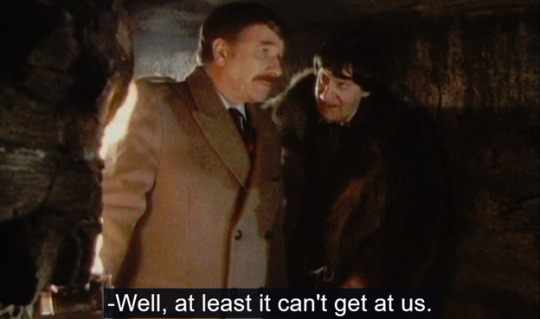
However, the Doctor notices a breeze farther in, so there must be another way out! He leaded the Brigadier farther into the cavern, which leads to a doorway.
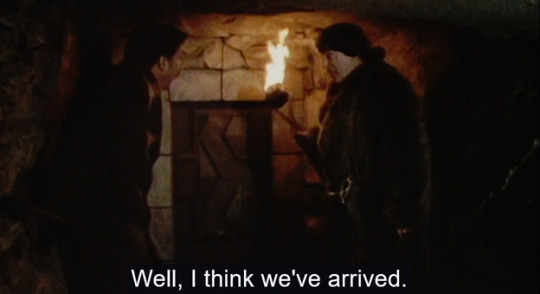
HOW CONVENIENT! (and a bit too easy)
Back at the TARDIS, the noise from whatever the Cybermen were doing has stopped, but now they’re doing something else. Turlough speculates…
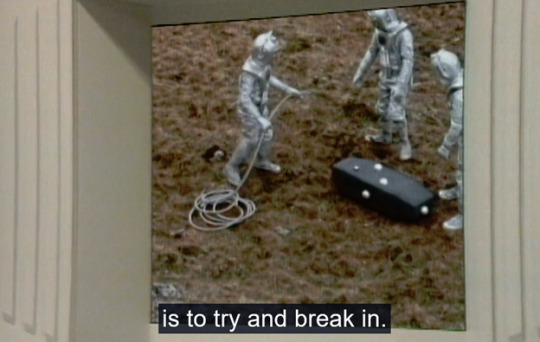
Turlough guesses that the large black device is a bomb.
And at the quarry, Sarah’s having a hell of a time standing still so the robot doesn’t attack. But then…
youtube
(Thanks to TJ DW)
Well, that was a lucky break!
Meanwhile at the Panoptican, the Doctor isn’t convinced the Castellan was guilty. Chancellor Flavia (the woman in the Council) promises to talk with the guard who shot the Castellan while the Doctr goes to speak with the President.
Back in the Death Zone, the Doctor and Sarah have reached the Tower…sorta. It’s across a chasm.

The Doctor has a better idea as he loops the end of the cable and tosses it across (he must have a hell of an arm!) The cable loops around an outcropping. They then slide across.
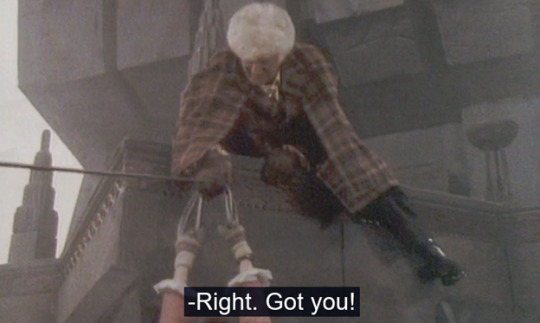
With that, they enter through the door up top. Down below, the Master looks on.

Elsewhere, the Doctor and Tegan have reached the Tower (actually!) and have gained entry. They come across a tiled floor. The Doctor tested the floor with coins and lasers erupted all over the floor!

How the hell did the Master get in so quickly?
Anyway, I don’t remember if it was mentioned earlier in the series, but the Master reveals that he and the Doctor attended Academy together (later in the series (it might’ve been the new series; I’m not certain), it’s revealed that the Doctor and the Master were childhood friends) The Master tells the Doctor and Tegan to hide as his Cybermen “allies” follow him up. He urges the Cybermen to cross the board…
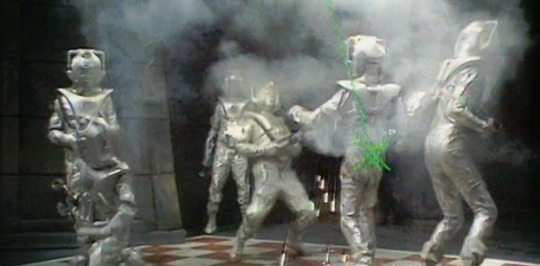
…with predictable results. The Master then gives the Doctor the clue to cross as he does so and runs ahead.
In the Council chambers, the President has disappeared, but the guards at the door didn’t see him leave. The Doctor has the guard alert Chancellor Flavia as he searches the room.
And in the Tower, Sarah is tired and needs to rest…
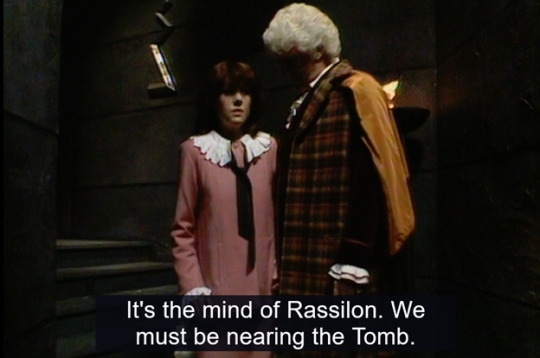
…so the Doctor scouts ahead and discovers…
youtube
(Thanks to LizShawsBestBits)
(Of course, Capt. Mike Yates didn’t appear on the show until after Liz Shaw had left, so there’s no way they should’ve known each other)
So the Tower can probe its invaders’ minds to pull memories from the past to use against them. That’s nasty.
Lower in the Tower, the Doctor and Tegan also feel the mind of Rassilon. The Doctor reassures Tegan there’s nothing to fear.

I’m not so sure about that, Doctor!
And with that, Part 3 ends. Now on to the conclusion!
In the bowels of the Tower, the Doctor and the Brigadier approach the Tomb to discover…
youtube
(Thanks to DoctorWhoClips)
(OK, I have a serious issue with this: Jamie and Zoe left the Doctor (with their memories wiped) less than five minutes before the Time Lords forced his regeneration. How the HELL does the Doctor know about Jamie and Zoe’s mindwipe?!)
Inside the Panoptican council chambers, the Doctor discovers…
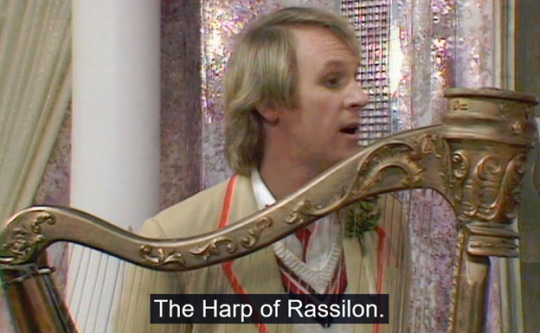
Knowing Rassilon wasn’t exactly known for his symphonies, the Doctor guesses that the harp was used to facilitate the President’s departure.
Inside the Tower, the Doctor finally reaches the Tomb of Rassilon.
youtube
(Thanks to Classic DW)
Should’ve known the Master would try to double cross the Doctor, although he’s definitely lost a step in his new body, since the Brigadier would’ve never gotten the drop on him otherwise (even if the Brigadier was in his prime)
Meanwhile, back at the TARDIS (did you remember Susan and Turlough are there?)
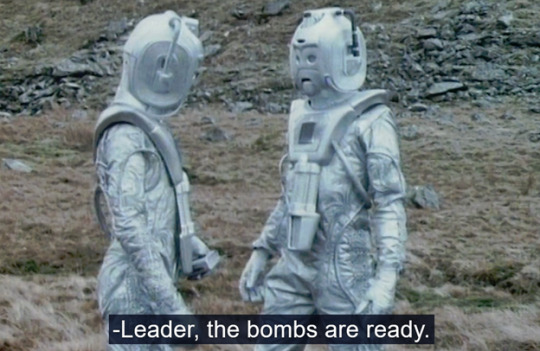
That’s not good…
And in the Panoptican, the Doctor plays the harp and…

…a secret panel opens. Inside, he sees the game board from the beginning of the story (remember that?) And who’s playing the game?
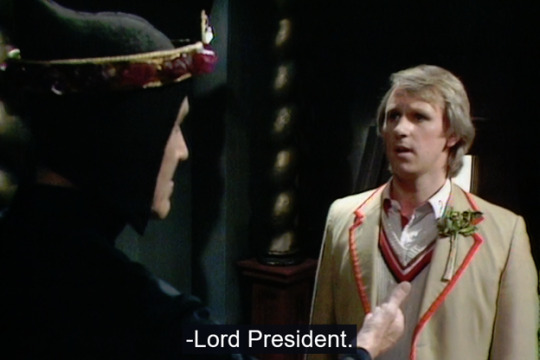
Next we get the Big Monologue about Barusa wanting to not give up his power, not just for his remaining incarnations, but forever…something even a Time Lord is incapable of.

Yes, well…Rassilon was a beast. Barusa is not.
Inside the Tomb of Rassilon, the Doctor lowers the force field trapping the TARDIS while Tegan, Sarah, and the Brigadier hog-tie the Master. And just in time as the TARDIS dematerializes just before the Cybermen set off the bombs, reappearing inside the Tomb.
Back at the Panoptican, Barusa contimues his monologue that the secret to immortality lies within the Tomb, but there are many dangers within.
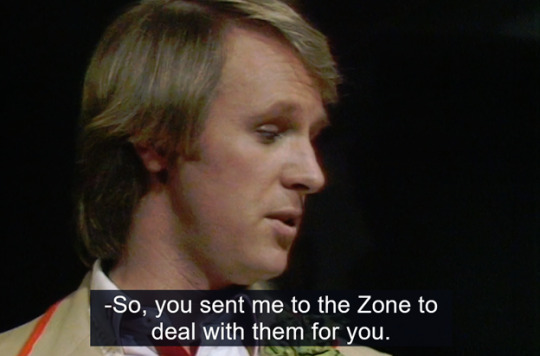
Then Barusa reveals he’s acquired more than just the Black Scrolls (remember those?), but also his crown, which amplifies his will and gives him the ability to control others, which he proves by commanding the Doctor to kneel before him.

With his will imposed, Barusa takes his Pet Doctor to claim his destiny.
The TARDIS rematerializes in the Tomb and Susan and Turlough exit to find the Doctor trying to reach the Panoptican. The Doctor answers.

Soon enough, the Doctor and Barusa arrive. After talking down to the humans (and Susan), he approaches the Doctors.
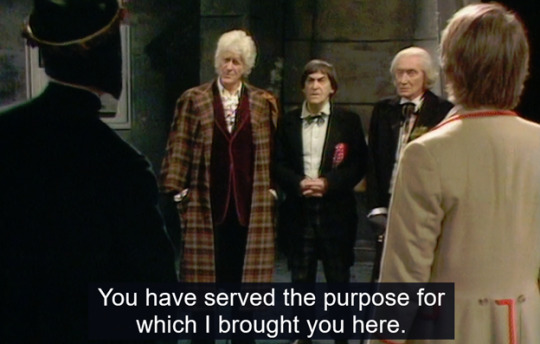
Barusa then makes a move to claim the Ring of Rassilon and gain his immortality.
youtube
(Thanks again to Classic DW)
Well, as the Chinese say: “Be careful what you wish for. You may get it.”
The Doctor asks that all his incarnations be returned to when they belong and that his fourth be rescued from the time vortex. Rassilon not only frees him, but also sends the Master to his own place in the time stream (wouldn’t that be the present?)
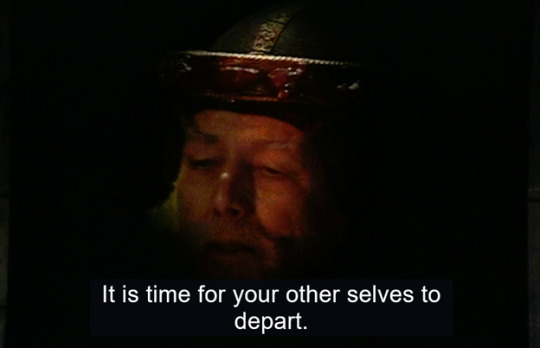
youtube
(Thanks again to DoctorWhoClips)
Sadly, there wasn’t a 30th anniversary story (or 40th). If there’s demand (and I can find the story outside of BritBox), I may do the 50th anniversary episode (though I would need to review the new series first)
0 notes
Note
Hiiii, Just a concerned Gallifreyan here!
What should I do if I have evidence of corruption in the High Council? I would contact Lord-Cardinal Borusa but I have reason to believe they are part of the problem.
Oh? Corruption with Lord Chancellor Borusa?
I highly doubt he’s done anything above his usual gossiping (it’s why he’s allowed at Women’s Bridge Club; bringing a dessert and good ☕️🫖 will get you invited to Flavia’s house😌).
I will admit though, your quite lucky to hit the anonymous button on this matrix site. Those kinds of claims could get the slander lawyers up in arms again. Especially against such a respected member of the Prydonian Chapter, and a former teacher of mine. If you have concerns, take it up with the CIA. They always are keeping an eye out for us…
And if you do run into the Lord Chancellor…you can tell him that Vulca finished his gloves he custom ordered ☺️.
Thank you!
~Lord Cardinal Lambda
P.S. if your going to accuse a high ranking member of our political system of treason or worse you should start by getting their title correct sweethearts.
((OOC: do not worry about the timelines we are just having fun ))
#lord cardinal lambda#timelord propaganda#doctor who rp#answered asks#Borusa#gallifrey#Gallifrey politics#timelords#lambda#lady vulca#LMAO FLAVIAS BRIDGE CLUB PARTIES ARE ALL#OLD WOMEN AND LESBIANS AND FUCKING BORUSA KEMMDDNM
12 notes
·
View notes
Text
It’s odd, my first reaction to this (as awesome as this meta is) was that the only Time Lords who don’t have names are Renegades, and all proper Time Lords have names.
The following Time Lord names were heard in Classic Who (on the show itself): Goth, Engin, Spandrell, Runcible, Borusa, Hildred, Solis, Pandak, Rassilon, Omega, Drax, Andred, Rodan, Flavia, Thalia, Morbius, Azmael, Hedin, Salyavin, Maxil, Damon, Kelner, and of course Romanadvoratrelundar
The DWEU expanded some of those names so they would better fit with Romana’s. For example, Andred’s full name is Andredaselus. However some of the extended names do not match that particular naming scheme, like Fuldanquin Borusa.
As for New Who, the credits of Hell Bent revealed the name of one of the Time Lords the Doctor interacted with in that episode, the soldier who said he had been at Skull Moon during the Time War was named Gastron. Some of the other Time Lords seen during Moffat’s era have been given names in the DWEU, including in works written by Moffat himself (Rassilon’s right hand guy in Day of the Doctor was named Androgar in Moffat’s novelization).
Interestingly, Drax was a Renegade but he continued to use his actual name.
We actually also heard on TV some more Gallifreyan names than those above. In the serial The Invasion of Time (1978) we are introduced to a group of Outsiders (Time Lord Academy drop outs who decided to leave the capitol and live in the desert) and the names we heard there were: Nesbin, Presta, Ablif and Jasko
Then there is the Sisterhood of Karn (Time Lords and other Gallifreyans who made the very understandable choice to leave Gallifrey and join a commune of lesbian witches). Named on screen members include New Who’s Ohila, and High Priestesses Maren and Ohica.
There is also commentary in the DWEU that tells us extended names like Romanadvoratrelundar are in Old High Gallifreyan, and are tied to social class. The names of the Houses some of the Time Lords are associated with also seem to be embedded in their names (for example, Romana is a member of House Dvora)
EIGHT: Ooooh. Now there’s a voice I recognize. Come on! Don’t be shy! Step forward! Celestial Intervention Agency Coordinator Vansellostophossius, if you please! Ah, oh I’m sorry I forget, you never were all that keen on the ostophossius bit, were you? Terribly common. Perfecter Zorak came up with something rather better if I remember rightly! VANSELL: If you really think I will be in the least bit affected by any sordid reminisces relating to our time at the Academy, all of six hundred years ago- EIGHT: Nosebung. That was it! Nosebung. Um, or, was it, uh, Toastrack? VANSELL: That wasn’t me, Doctor! As well you know it. EIGHT: Ah. Yes. Well, quite right Vansell. I do apologize. No need to get sniffy.
Neverland, Doctor Who Main Range 33, written by Alan Barnes, directed by Gary Russell, June 2002
VALYES: Good morning ladies and gentlemen and others! My name is Valyestriandruluma, although for those of you visiting our shores lacking grounding in the Old High Gallifreyan language, it may be easier to refer to me as Acting Chancellor Valyes.
Insurgency, Gallifrey 2.4, written by Steve Lyons, directed by Gary Russell, June 2005
Buuuuuuuuuuuut as soon as I started to think about those names, it also occurred to me that an argument can actually be made that all of those names are just nicknames.
There is a exchange in a Virgin Missing Adventure novel from 1995 that suggests that Romanadvoratrelundar, like Theta Sigma, is an Academy nickname (in 2015 Big Finish adapted this book into an audio drama. They left the dialogue in this scene as it is in their adaption):
‘Your brushwork is awfully broad,’ said the Doctor, who was looking over his shoulder. ‘Naturally,’ the artist replied. ‘It’s a very broad work, conceptually speaking.’ He broke off and stared at the Doctor. ‘And who in the halls of Hades might you be?’ The Doctor bowed. ‘Well, I’m the Doctor, this is Romana, and we’re travellers, and we thought we’d take a look at your gallery, and...’ He trailed off as he realized that the artist was not listening. The fellow was frantically smoothing at his bald head with one hand, attending to hair that had disappeared long ago. The other hand was extended towards Romana. His large rolling eyes were occupied in an active appraisal of her. The Doctor huffed. Romana tended to bring this reaction out in people. It was most irritating. ‘Ramona,’ the artist said slowly. ‘Romana,’ she corrected him. ‘Romana.’ His slippery tongue relished every syllable. He took her hand and planted a small kiss upon it. ‘An enchanting name for an enchanting young woman. Where did you come by it?’ ‘Prydon Academy,’ she told him. ‘And I’m actually a lady.’ He took a step back and emitted a seedy chuckle from the deepest point of his larynx. ‘A lady, oh, of course, yes, I should have realized! A regal vision! The noble brow, the milk white skin, those pert lips.’ The Doctor coughed. ‘Er, excuse me?’
The Romance of Crime (1995) by Gareth Roberts
Speaking of Theta Sigma, here are the two times that name is used on screen:
The first is when the Doctor runs into Drax:



The Doctor corrects Drax and tells him to stop calling him by that name later in their conversation



The Armageddon Factor, Season 16 Serial 6, written by Bob Baker & Dave Martin, directed by Michael Hayes, January 20 - February 24th 1979
The second that name is used in the TV show was in episode that aired almost ten years later, when the Doctor made it clear that Theta Sigma was a nickname they were given at Prydon Academy.



The Happiness Patrol, Season 25 Serial 2, written by Graeme Curry, directed by Chris Clough, November 2-16 1988
So there is some textual basis to argue, if you want to, that the names of non-Renegade Time Lords were nicknames like Theta Sigma, given to them at the Academy and not their true names, which are unspoken for the reasons outlined in the above meta.
Circular Galifreyan: Answering the First Question, And Why the Doctor Keeps Their Name a Secret
SPOILERS FOR ARRIVAL (2016)
I just watched Arrival and it got me thinking. The alien species in that movie (Heptapods) use a language that is circular – words and whole sentences look like this:

This is because Heptapods have the ability to see into the future, so when they use a word or object, they are defining that thing’s entire existence, from creation to destruction.
Do you know what other alien language is primarily based on circles, and is used by a race that can see through time?
Circular Galifreyan.

Now I know the show has established grammar rules for how this language works, but I couldn’t help thinking, what if the Time Lords moved away from Old High Galifreyan (pictured below) once they invented time-travel because it made them look at the universe in an entirely different way?

Now when discussing objects, Time Lords had to take their entire histories into account, so their language changed to accommodate that.
But what does that mean about the names of people?
A person’s name in Circular Galifreyan is not just a statement of who they are. It is also everything they ever were. Everything they ever will be. Their names act as prophecies for the people they will become.
At the same time, people aren’t objects. They are autonomous, and time isn’t fixed. They have the ability to better themselves and change their futures, thus changing their names in Circular Galifreyan
This is why Time Lords never use their real names, only titles. Out of respect for a person’s privacy and protection, because revealing their name in Circular Galifreyan is dangerous, exposing their future to a stranger that could manipulate them or judge them for things they haven’t even done yet.
So, Time Lords have two names; the one in Circular Galifreyan, which is a closely guarded secret, and the name they choose. This title can be a statement of intent (e.g. Lord Master), or an acceptance of the fate or duty laid out for them by their name (e.g. Lord General).
Or it could be an attempt to deny the prophecy, an attempt to change the future before it happens, even if it’s impossible.
Hence, Lord Doctor.
Imagine it, as a child, knowing you will commit terrible crimes, genocides, that you will destroy entire universes, because your name says so. No wonder the Doctor was an outcast from Galifrey, shunned by his own people, sleeping in the barn alone. No wonder they said he’d never make a Time Lord, because he was destined for war and slaughter, not learning. No wonder their best friend was the Master, driven insane as a child with an insatiable lust for power.
No wonder the prophecy of the Hybrid terrified him as a child – he knew it was him the prophecy spoke about because his name told him so. No wonder he ran away, no wonder he’s so determined to play the hero, no wonder he hated soldiers and war and weapons so much, even before he had a real reason to.
He knew the Time War was coming. But maybe there was still a chance for him to change the future.
In Twice Upon A Time, the First Doctor says he ran away to discover the source of good in the universe - the thing that kept evil at bay. What if he was trying to save himself? Trying to find the thing that could fix his destiny and save him from becoming a monster.
So he became that force of good almost accidentally, trying to prove there was still a chance for him, and saved everyone but himself.
No wonder she doesn’t tell anyone her name.
But we already know it. Because if the Doctor’s name is a summary of everything they’ve ever done and ever will do, every world saved and every life touched, it means the title of 7x13 The Name of the Doctor meant literally that - the Doctor’s time stream is their name.
It also explains the 12th Doctor saying that children know his name. 12 often breaks the 4th wall to talk to the audience, and this is him doing it again - he’s telling the children that watch the show that by doing so - by seeing the Doctor rise and fall and save and run - we understand them. We know them. We’re in on the joke, more than any character within the fiction of the show could be.
This explains why River Song - an archaeologist who dedicated her life to studying the Doctor - knows their name. It also explains why the Doctor considered this mortal woman his soulmate. They were both destined to be murderers, but they both rebelled against the destinies others gave them.
The title of this show is a question - Doctor Who - and the show itself is the answer. Actions speak louder than words.
#this got really long#but I REALLY like that meta and wanted to figure out a way to make it work!#Doctor Who#long post#Whenever I mention anything by him I feel obligated to say that Gareth Roberts is a terrible person#You may recognize his name because he wrote many many many episodes of both New Who and The Sarah Jane Adventures#Gareth Roberts is a transphobe#If you want to know more feel free to google what he’s said#He is currently banned from writing for Doctor Who at BBC Books because of his transphobia#He claims that by asking him to respect trans people BBC books is discriminating against him for being a gay Conservative#I really feel obligated to remind people he is a piece of shit if/when I mention anything written by him
2K notes
·
View notes
Text
The Political Will to Avert a No-Deal Brexit Is Ebbing Fast
(Bloomberg) -- Brexit from afar is looking like a disaster about to happen. One European official, watching the situation up close, compared it to two cars driving at high speed toward each other with each expecting the other to swerve out of the way first.It’s not the first time that the brinkmanship around the U.K.’s departure from the European Union has been compared to a game of chicken. Trust is in short supply and there’s a sinking feeling that the desire to get a deal done to avert the potential economic catastrophe of a no deal is evaporating.Conversations with officials on the either side of the negotiating table paint a grim picture of the state of play as an Oct. 31 deadline looms. Across EU capitals, the question asked is if Prime Minister Boris Johnson has a plan up his sleeve and if so -- when can they see it.Will they have to wait for a crunch summit less than two weeks before the crash-out scenario? At a meeting in Paris, French President Emmanuel Macron and Finnish Prime Minister Antti Rinne, agreed the U.K. must present a written proposal for a deal by Sept. 30.These deadlines are largely meaningless -- more a way of trying to exert pressure on the U.K. that under Johnson seems largely impervious to it. His predecessor, Theresa May, buckled at various points and asked for extensions.No DelayBut pushing back departure beyond Oct. 31 is a red line for a more combative leader who has framed success around just getting Brexit done. The political cost of backing down and compromising keeps getting higher -- on all sides -- and that makes it hard to see a way out even as talks are ostensibly ongoing.And while kicking the ball down the road is how many crises are dealt with in Brussels, more than two years of negotiations that keep going around in circles have taken its toll. Brexit fatigue is a thing not just with voters. Europe also wants to move on.Officials say reaching a successful conclusion is a long shot, and there is evidence of bad blood. Luxembourg’s Xavier Bettel vented at a news conference about his frustration with the “nightmare” Brexit process, a view probably many leaders share behind closed doors. He may have been grandstanding, but he showed how patience is running out.While officials in Berlin, Paris and Dublin have revised their earlier assumptions that Johnson doesn’t want a deal, they don’t believe he knows how to get there. Over in London, a senior U.K. official said there isn’t much sign the EU is prepared to give Johnson what he needs.“The risk of no deal is very real,” European Commission President Jean-Claude Juncker told the European Parliament in Strasbourg, France on Wednesday in comments that sent the pound falling. And while a deal is preferable, he’s “not sure we will get there.”The sticking point remains the backstop -- a series of measures the EU says is needed to prevent the return of customs infrastructure on the Irish border. In its existing form it would keep the whole of the U.K. in a customs union with the bloc until a future trade deal solved the border problem.The EU is willing to adapt that to apply to Northern Ireland only, leaving the rest of the U.K. to diverge from European rules, but the government has said that isn’t acceptable either.Despite tough talking in public, Johnson’s envoy to the EU and European Commission negotiators have discussed possible solutions, although the U.K. hasn’t presented anything on paper. This is a deliberate attempt by the British side to prevent ideas becoming public only then to be immediately rejected, according to U.K. officials.While the EU is frustrated by this, it does understand the strategy and was always expecting British proposals closer to the EU summit scheduled for Oct. 17-18, one official said.The German government, for its part, hasn’t thrown in the towel. “I’ll say again now, just as I said during Boris Johnson’s visit, that I continue to see the possibility of an orderly exit,” Chancellor Angela Merkel told reporters in Berlin.The EU is keeping a close eye on U.K. domestic politics, too, which have shaped so much of the trajectory of negotiations. Parliament’s victory in forcing Johnson to seek a Brexit delay -- if he hasn’t got a deal after next month’s summit -- is part of their calculus on when compromise might happen.Ireland, which out of the EU economies has the most to lose if the U.K. leaves without a deal, doesn’t see a reason to compromise until the legal battle in London plays out. It’s still waiting to see if Johnson will indeed defy the law as he’s said he’s prepared to.Irish Prime Minister Leo Varadkar, like Johnson himself, is on an election footing. Caving in to the U.K. would risk being seen as a sign of weakness. It’s far from clear which, if either, leader will give way.\--With assistance from Thomas Penny, Dara Doyle, Patrick Donahue, Gregory Viscusi, Kati Pohjanpalo and Paul Tugwell.To contact the reporters on this story: Ian Wishart in Brussels at [email protected];Tim Ross in London at [email protected] contact the editors responsible for this story: Ben Sills at [email protected], Flavia Krause-JacksonFor more articles like this, please visit us at bloomberg.com©2019 Bloomberg L.P.
from Yahoo News - Latest News & Headlines
(Bloomberg) -- Brexit from afar is looking like a disaster about to happen. One European official, watching the situation up close, compared it to two cars driving at high speed toward each other with each expecting the other to swerve out of the way first.It’s not the first time that the brinkmanship around the U.K.’s departure from the European Union has been compared to a game of chicken. Trust is in short supply and there’s a sinking feeling that the desire to get a deal done to avert the potential economic catastrophe of a no deal is evaporating.Conversations with officials on the either side of the negotiating table paint a grim picture of the state of play as an Oct. 31 deadline looms. Across EU capitals, the question asked is if Prime Minister Boris Johnson has a plan up his sleeve and if so -- when can they see it.Will they have to wait for a crunch summit less than two weeks before the crash-out scenario? At a meeting in Paris, French President Emmanuel Macron and Finnish Prime Minister Antti Rinne, agreed the U.K. must present a written proposal for a deal by Sept. 30.These deadlines are largely meaningless -- more a way of trying to exert pressure on the U.K. that under Johnson seems largely impervious to it. His predecessor, Theresa May, buckled at various points and asked for extensions.No DelayBut pushing back departure beyond Oct. 31 is a red line for a more combative leader who has framed success around just getting Brexit done. The political cost of backing down and compromising keeps getting higher -- on all sides -- and that makes it hard to see a way out even as talks are ostensibly ongoing.And while kicking the ball down the road is how many crises are dealt with in Brussels, more than two years of negotiations that keep going around in circles have taken its toll. Brexit fatigue is a thing not just with voters. Europe also wants to move on.Officials say reaching a successful conclusion is a long shot, and there is evidence of bad blood. Luxembourg’s Xavier Bettel vented at a news conference about his frustration with the “nightmare” Brexit process, a view probably many leaders share behind closed doors. He may have been grandstanding, but he showed how patience is running out.While officials in Berlin, Paris and Dublin have revised their earlier assumptions that Johnson doesn’t want a deal, they don’t believe he knows how to get there. Over in London, a senior U.K. official said there isn’t much sign the EU is prepared to give Johnson what he needs.“The risk of no deal is very real,” European Commission President Jean-Claude Juncker told the European Parliament in Strasbourg, France on Wednesday in comments that sent the pound falling. And while a deal is preferable, he’s “not sure we will get there.”The sticking point remains the backstop -- a series of measures the EU says is needed to prevent the return of customs infrastructure on the Irish border. In its existing form it would keep the whole of the U.K. in a customs union with the bloc until a future trade deal solved the border problem.The EU is willing to adapt that to apply to Northern Ireland only, leaving the rest of the U.K. to diverge from European rules, but the government has said that isn’t acceptable either.Despite tough talking in public, Johnson’s envoy to the EU and European Commission negotiators have discussed possible solutions, although the U.K. hasn’t presented anything on paper. This is a deliberate attempt by the British side to prevent ideas becoming public only then to be immediately rejected, according to U.K. officials.While the EU is frustrated by this, it does understand the strategy and was always expecting British proposals closer to the EU summit scheduled for Oct. 17-18, one official said.The German government, for its part, hasn’t thrown in the towel. “I’ll say again now, just as I said during Boris Johnson’s visit, that I continue to see the possibility of an orderly exit,” Chancellor Angela Merkel told reporters in Berlin.The EU is keeping a close eye on U.K. domestic politics, too, which have shaped so much of the trajectory of negotiations. Parliament’s victory in forcing Johnson to seek a Brexit delay -- if he hasn’t got a deal after next month’s summit -- is part of their calculus on when compromise might happen.Ireland, which out of the EU economies has the most to lose if the U.K. leaves without a deal, doesn’t see a reason to compromise until the legal battle in London plays out. It’s still waiting to see if Johnson will indeed defy the law as he’s said he’s prepared to.Irish Prime Minister Leo Varadkar, like Johnson himself, is on an election footing. Caving in to the U.K. would risk being seen as a sign of weakness. It’s far from clear which, if either, leader will give way.\--With assistance from Thomas Penny, Dara Doyle, Patrick Donahue, Gregory Viscusi, Kati Pohjanpalo and Paul Tugwell.To contact the reporters on this story: Ian Wishart in Brussels at [email protected];Tim Ross in London at [email protected] contact the editors responsible for this story: Ben Sills at [email protected], Flavia Krause-JacksonFor more articles like this, please visit us at bloomberg.com©2019 Bloomberg L.P.
September 18, 2019 at 10:05PM via IFTTT
0 notes
Text
Trump’s Sales Pitch: Hold the Next G-7 at His Miami Golf Resort
(Bloomberg) -- U.S. President Donald Trump knows of a perfect location for next year’s Group of Seven summit in the United States: Trump Doral golf resort in Miami.“We haven’t found anything that could really come close to competing with it,” Trump said, stressing however that no final decisions have been made.Trump ticked off all the great advantages of a global summit in the Sunshine State of Florida. “It’s very big” and it’s Miami, “so it’s a great area.” He told German Chancellor Angela Merkel, sitting next to him, that she would be just a three-minute helicopter ride from the airport to the site.“People are really liking it,” Trump said. “Plus it has buildings that are 50 to 70 units so each delegation can have its own building, so you’d have the seven various delegations that could have their own building.”Trump has already run afoul of ethics experts and faced multiple lawsuits over his continued involvement with some of his private business, such as the Trump International Hotel in Washington. Locating a global summit on one of his properties would open him up to a slew of new allegations that he’s mixing his private financial gain with his public position as commander in chief.The Trump Organization has donated profit from foreign governments to the U.S. Treasury, part of a bid to counter criticism that Trump may be violating the U.S. Constitution’s emoluments clauses by accepting payments from foreign governments.Still, Doral would benefit in other ways from hosting a summit of world leaders. The resort would get free publicity that could help boost future profit.The president placed his business holdings in a revocable trust that allows him to continue to profit from his company’s activities. His sons Eric and Donald Jr. run the Trump Organization. Democrats and watchdog groups have repeatedly criticized Trump for maintaining his business while in public office.Doral is definitely built more for play than work, and its website boasts that it’s only eight miles for the Miami airport. It’s 800 acres, boasts four golf courses and 643 rooms, plus more than 100,000 square feet of event space -- including the Donald J. Trump Grand Ballroom.Doral may have fallen on hard times financially. Trump’s financial disclosure showed the property had $74.8 million in 2018 income, down from about $115.9 million.A number of high-profile companies and industry groups have held meetings there since Trump took office, including private prison company Geo Group Inc., a major beneficiary of Trump’s immigration policies. Separately, the Community Financial Services Association of America, a payday lenders trade group, held a 2019 event there in March amid efforts to roll back consumer protections in the industry.(Updates with donations to charity starting in fifth paragraph.)To contact the reporters on this story: Jennifer Jacobs in Biarritz, France at [email protected];Josh Wingrove in Biarritz, France at [email protected];Jonathan Levin in Miami at [email protected] contact the editors responsible for this story: Craig Gordon at [email protected], ;Rosalind Mathieson at [email protected], ;Flavia Krause-Jackson at [email protected], Justin Blum, Joshua GalluFor more articles like this, please visit us at bloomberg.com©2019 Bloomberg L.P.
from Yahoo News - Latest News & Headlines
(Bloomberg) -- U.S. President Donald Trump knows of a perfect location for next year’s Group of Seven summit in the United States: Trump Doral golf resort in Miami.“We haven’t found anything that could really come close to competing with it,” Trump said, stressing however that no final decisions have been made.Trump ticked off all the great advantages of a global summit in the Sunshine State of Florida. “It’s very big” and it’s Miami, “so it’s a great area.” He told German Chancellor Angela Merkel, sitting next to him, that she would be just a three-minute helicopter ride from the airport to the site.“People are really liking it,” Trump said. “Plus it has buildings that are 50 to 70 units so each delegation can have its own building, so you’d have the seven various delegations that could have their own building.”Trump has already run afoul of ethics experts and faced multiple lawsuits over his continued involvement with some of his private business, such as the Trump International Hotel in Washington. Locating a global summit on one of his properties would open him up to a slew of new allegations that he’s mixing his private financial gain with his public position as commander in chief.The Trump Organization has donated profit from foreign governments to the U.S. Treasury, part of a bid to counter criticism that Trump may be violating the U.S. Constitution’s emoluments clauses by accepting payments from foreign governments.Still, Doral would benefit in other ways from hosting a summit of world leaders. The resort would get free publicity that could help boost future profit.The president placed his business holdings in a revocable trust that allows him to continue to profit from his company’s activities. His sons Eric and Donald Jr. run the Trump Organization. Democrats and watchdog groups have repeatedly criticized Trump for maintaining his business while in public office.Doral is definitely built more for play than work, and its website boasts that it’s only eight miles for the Miami airport. It’s 800 acres, boasts four golf courses and 643 rooms, plus more than 100,000 square feet of event space -- including the Donald J. Trump Grand Ballroom.Doral may have fallen on hard times financially. Trump’s financial disclosure showed the property had $74.8 million in 2018 income, down from about $115.9 million.A number of high-profile companies and industry groups have held meetings there since Trump took office, including private prison company Geo Group Inc., a major beneficiary of Trump’s immigration policies. Separately, the Community Financial Services Association of America, a payday lenders trade group, held a 2019 event there in March amid efforts to roll back consumer protections in the industry.(Updates with donations to charity starting in fifth paragraph.)To contact the reporters on this story: Jennifer Jacobs in Biarritz, France at [email protected];Josh Wingrove in Biarritz, France at [email protected];Jonathan Levin in Miami at [email protected] contact the editors responsible for this story: Craig Gordon at [email protected], ;Rosalind Mathieson at [email protected], ;Flavia Krause-Jackson at [email protected], Justin Blum, Joshua GalluFor more articles like this, please visit us at bloomberg.com©2019 Bloomberg L.P.
August 26, 2019 at 03:33PM via IFTTT
0 notes
Text
Inside Macron’s Plan to Control G-7 and Lecture Trump on Climate
(Bloomberg) -- On the edge of a rocky cliff reaching into the Atlantic, Emmanuel Macron stood ready to point his guests toward the white lighthouse where he was about to sit his fellow Group of Seven leaders down to a serious talk about the climate, over glasses of champagne.Last in was Donald Trump, who doesn’t drink alcohol, doesn’t enjoy being lectured to (especially about the environment) and who, in spite of an outwardly amicable two-hour lunch with his host, suspected the French president might be trying to outwit the U.S. with his summit choreography.And he’s not exactly wrong to be worried.Macron had ripped up the script before anyone even landed in the seaside resort of Biarritz: picking a fight with Brazil over Amazon forest fires, surprising the Europeans with a threat to block a trade deal with Latin America, and keeping allies guessing about what trick he would pull next.The secrecy extended to the dinner on Saturday night. Normally aides would be able to listen in to the leaders’ conversation from an adjacent room. Not this time. The French say their plan was to have a G-7 more like the original, intimate versions of the 1970s, when heads of state could talk frankly, perhaps over brandy and cigars, without handlers.Global ThreatsWith mounting threats to the global economy, divisions over Iran, and the Amazon fires creating a sense of crisis about the environment, the French organizers also want to avoid leaks that could lead to the kind of public bust-ups that have marred other recent international gatherings. For better or worse, G-7 meetings are a critical institution when it comes to addressing truly worldwide problems.What the French hosts can’t control is a U.S. leader who already seems on edge, after spending Friday lashing out at the Federal Reserve and China as the trade war he began risks tipping the world into recession.In Chancellor Angela Merkel’s view, Trump came to the summit weakened by the possible economic consequences of the trade dispute with China, according to a senior German official.U.S. ComplaintsAs soon as they landed, U.S. officials complained that Macron was trying to fashion the weekend’s agenda to isolate Trump, framing it around climate change and straying from the G-7’s original purpose as an economic bloc. French officials at every level had been difficult to deal with in preparation for the summit, the Americans said.They accused the French of ignoring U.S. input and then blaming Washington for blocking consensus. It was an attack that caught the French off-guard. Macron’s officials disputed the account, pointing out that the first item on the agenda when Sunday’s work sessions get under way will be trade and the global economy, Trump’s main priority.The cracks are showing, even as Macron tries to paper over them. He grabbed Trump as soon as the U.S. leader arrived and invited him for lunch -- a spur-of-the-moment gesture at an often meticulously-scheduled event. It looked cordial enough, although Trump did slip in that “every so often we go at it a little bit.”Still, in a tweet sent shortly before 1 a.m. Sunday local time Trump praised France, Macron and said his dinner with other leaders “went very well.” It never gets easier to deal with Trump, the German official said. Merkel always invites him to Germany when she sees him and he always accepts. But nothing comes of it; Trump’s main visit to Germany as president was for a G-20 summit in July 2017.Softening Up TrumpIn the opening maneuvers in Biarritz, the German official said, European leaders will be trying to soften Trump up so that he’ll be more responsive to their key message -- that his trade war is hurting all of them.But how to deliver that message in a way that it can be heard? Macron has already shelved the one-communique format in favor of statements on various things the leaders can agree on, but which U.S. officials saw as niche matters.French officials said Macron wanted to ease his conflicts with Trump over climate, trade and a new French tax that hits U.S. internet giants. But his main play was over Iran.Over lunch, Macron suggested a proposal allowing Iran to export oil for a limited period of time if it returned to compliance with the nuclear accord and agrees to formal talks. The French side had no comment on Trump’s reaction to the idea, but it would be a comprehensive reversal of his Middle East strategy if he signed up to it. A U.S. official deemed it a non-starter.Hot Mic IncidentMacron’s climate gambit doesn’t look likely to succeed either, and not just because of Trump. His fast-and-furious actions against Brazil were done without consulting his allies and many disagreed with the tactic of linking climate with trade, rather than tackling them separately.A German official said the chancellor found Macron’s knee-jerk reaction unhelpful and Boris Johnson, the newly-minted U.K. prime minister, wasn’t impressed either. “There are all sorts of people who will take any excuse at all to interfere with trade and to frustrate trade deals, and I don’t want to see that,” Johnson told reporters.As they settled down to the talks, a television camera caught a rare example of how high-level diplomacy works. The Europeans were gathered around a table, brainstorming on how to delicately apply pressure on Brazilian President Jair Bolsonaro to tame the Amazon fires, without antagonizing him all over again.Merkel said she would call him next week “so he gets the impression that we are not working against him.” Johnson nodded vigorously in agreement: “I think this is important.”���Yeah, yeah, I am with you,” said Macron. “Do we call him...?”Moments later, a hand jammed into the lens of the camera, and the feed died.\--With assistance from Arne Delfs and Josh Wingrove.To contact the reporters on this story: Helene Fouquet in Biarritz at [email protected];Jennifer Jacobs in Biarritz at [email protected];Ian Wishart in Biarritz, France at [email protected] contact the editors responsible for this story: Rosalind Mathieson at [email protected], ;Flavia Krause-Jackson at [email protected], Ben Sills, Ros KrasnyFor more articles like this, please visit us at bloomberg.com©2019 Bloomberg L.P.
from Yahoo News - Latest News & Headlines
(Bloomberg) -- On the edge of a rocky cliff reaching into the Atlantic, Emmanuel Macron stood ready to point his guests toward the white lighthouse where he was about to sit his fellow Group of Seven leaders down to a serious talk about the climate, over glasses of champagne.Last in was Donald Trump, who doesn’t drink alcohol, doesn’t enjoy being lectured to (especially about the environment) and who, in spite of an outwardly amicable two-hour lunch with his host, suspected the French president might be trying to outwit the U.S. with his summit choreography.And he’s not exactly wrong to be worried.Macron had ripped up the script before anyone even landed in the seaside resort of Biarritz: picking a fight with Brazil over Amazon forest fires, surprising the Europeans with a threat to block a trade deal with Latin America, and keeping allies guessing about what trick he would pull next.The secrecy extended to the dinner on Saturday night. Normally aides would be able to listen in to the leaders’ conversation from an adjacent room. Not this time. The French say their plan was to have a G-7 more like the original, intimate versions of the 1970s, when heads of state could talk frankly, perhaps over brandy and cigars, without handlers.Global ThreatsWith mounting threats to the global economy, divisions over Iran, and the Amazon fires creating a sense of crisis about the environment, the French organizers also want to avoid leaks that could lead to the kind of public bust-ups that have marred other recent international gatherings. For better or worse, G-7 meetings are a critical institution when it comes to addressing truly worldwide problems.What the French hosts can’t control is a U.S. leader who already seems on edge, after spending Friday lashing out at the Federal Reserve and China as the trade war he began risks tipping the world into recession.In Chancellor Angela Merkel’s view, Trump came to the summit weakened by the possible economic consequences of the trade dispute with China, according to a senior German official.U.S. ComplaintsAs soon as they landed, U.S. officials complained that Macron was trying to fashion the weekend’s agenda to isolate Trump, framing it around climate change and straying from the G-7’s original purpose as an economic bloc. French officials at every level had been difficult to deal with in preparation for the summit, the Americans said.They accused the French of ignoring U.S. input and then blaming Washington for blocking consensus. It was an attack that caught the French off-guard. Macron’s officials disputed the account, pointing out that the first item on the agenda when Sunday’s work sessions get under way will be trade and the global economy, Trump’s main priority.The cracks are showing, even as Macron tries to paper over them. He grabbed Trump as soon as the U.S. leader arrived and invited him for lunch -- a spur-of-the-moment gesture at an often meticulously-scheduled event. It looked cordial enough, although Trump did slip in that “every so often we go at it a little bit.”Still, in a tweet sent shortly before 1 a.m. Sunday local time Trump praised France, Macron and said his dinner with other leaders “went very well.” It never gets easier to deal with Trump, the German official said. Merkel always invites him to Germany when she sees him and he always accepts. But nothing comes of it; Trump’s main visit to Germany as president was for a G-20 summit in July 2017.Softening Up TrumpIn the opening maneuvers in Biarritz, the German official said, European leaders will be trying to soften Trump up so that he’ll be more responsive to their key message -- that his trade war is hurting all of them.But how to deliver that message in a way that it can be heard? Macron has already shelved the one-communique format in favor of statements on various things the leaders can agree on, but which U.S. officials saw as niche matters.French officials said Macron wanted to ease his conflicts with Trump over climate, trade and a new French tax that hits U.S. internet giants. But his main play was over Iran.Over lunch, Macron suggested a proposal allowing Iran to export oil for a limited period of time if it returned to compliance with the nuclear accord and agrees to formal talks. The French side had no comment on Trump’s reaction to the idea, but it would be a comprehensive reversal of his Middle East strategy if he signed up to it. A U.S. official deemed it a non-starter.Hot Mic IncidentMacron’s climate gambit doesn’t look likely to succeed either, and not just because of Trump. His fast-and-furious actions against Brazil were done without consulting his allies and many disagreed with the tactic of linking climate with trade, rather than tackling them separately.A German official said the chancellor found Macron’s knee-jerk reaction unhelpful and Boris Johnson, the newly-minted U.K. prime minister, wasn’t impressed either. “There are all sorts of people who will take any excuse at all to interfere with trade and to frustrate trade deals, and I don’t want to see that,” Johnson told reporters.As they settled down to the talks, a television camera caught a rare example of how high-level diplomacy works. The Europeans were gathered around a table, brainstorming on how to delicately apply pressure on Brazilian President Jair Bolsonaro to tame the Amazon fires, without antagonizing him all over again.Merkel said she would call him next week “so he gets the impression that we are not working against him.” Johnson nodded vigorously in agreement: “I think this is important.”“Yeah, yeah, I am with you,” said Macron. “Do we call him...?”Moments later, a hand jammed into the lens of the camera, and the feed died.\--With assistance from Arne Delfs and Josh Wingrove.To contact the reporters on this story: Helene Fouquet in Biarritz at [email protected];Jennifer Jacobs in Biarritz at [email protected];Ian Wishart in Biarritz, France at [email protected] contact the editors responsible for this story: Rosalind Mathieson at [email protected], ;Flavia Krause-Jackson at [email protected], Ben Sills, Ros KrasnyFor more articles like this, please visit us at bloomberg.com©2019 Bloomberg L.P.
August 24, 2019 at 11:14PM via IFTTT
0 notes
Text
Trump’s Young Friend in Europe Looks to Life After Merkel
(Bloomberg) -- When Sebastian Kurz was an aspiring politician barely out of his teens, Austrian establishment grandees offered him some wise words: If you want to make it to the top, remember you’re always in the public eye. He took the advice.“While others were partying until the morning light, Sebastian always knew when it was enough,” said Philipp Depisch, 39, an ally of Kurz from the early 2000s. “When we went to the bar, he organized a round of drinks for everyone and stayed for a while, but at some point he would get up and go to bed.”Such attention to his persona helped put Kurz on a breakneck journey to become Europe’s youngest head of government less than a decade later. Now the next few months will decide whether the 32-year-old can morph from youthful curiosity into a European statesman and affirm his role as the new hope for the continent’s conservative forces.Kurz heads into an election campaign with scrutiny never higher after a scandal involving his far-right coalition partner brought an end to his 18-month stint as Austrian chancellor in May. A solid victory could make him a power broker at home and in the fractious European Union as German Chancellor Angela Merkel prepares to step down.Combining a hard line on uncontrolled immigration with his honed image as the courteous good son of Austria, Kurz contrasts with the nationalist zeal of Hungarian Prime Minister Viktor Orban and Italy’s Matteo Salvini.Kurz has cozy chats with U.S. President Donald Trump and Russia’s Vladimir Putin while maintaining a frosty rather than confrontational relationship with Merkel. Last year, when her Bavarian allies tested her authority over migration policy, Kurz appeared alongside Merkel’s antagonists and toured German talk shows discussing the need to protect borders.“The guy has demonstrated himself to be a supreme political operator,” said Carsten Nickel, managing director of Teneo, a company in London that advises on political risk. As for the EU, he’s no savior but he also doesn’t want to undermine it, he said. “Kurz clearly hasn’t sided with the euroskeptics, but we see a different approach than Merkel. He’s more of a center-right traditionalist.”Like rebranding the People’s Party with the color turquoise instead of its traditional black, Kurz is about rejuvenating old conservative ideas. His main conviction is distancing himself from the social democrats, who he blames for years of inaction in Austrian government. That led him to form an alliance in 2017 with the Freedom Party, which has links to neo-Nazis.He will go into the Sept. 29 election as Austria’s most popular party leader even after he effectively sank his own government following the revelation of a video of a senior coalition official trying to curry favor with a fake niece of a Russian oligarch.“Public perception can change extremely quickly,” Kurz said in an interview in Vienna last week. “In such a situation, you do not know what is good for you personally or the party.”The appeal at home is drawn from his clean-cut image, the blue-eyed former tennis coach heeding the counsel of the elder statesmen in the People’s Party as he was handpicked to climb the ranks. He names one of them, former Austrian Chancellor Wolfgang Schuessel, among his political heroes.Kurz was told to keep his private life private, so he does. The only child of an engineering father and school teacher mother, he enrolled as a law student in Vienna, though never finished his studies. He lives with his girlfriend, whom he met fresh out of school, in an unassuming apartment building in the modest Meidling neighborhood where he grew up and likes to unwind with the occasional drink in a local cocktail bar.He keeps his posts to his 1 million social media followers strictly business, tweeting about policy initiatives. You’d never catch him sharing what he had for lunch that day, Kurz said at Vienna’s grand Springer Villa, used by the People’s Party for meetings and down the road from where he grew up.That, though, doesn’t make him inscrutable, he said, bristling at the suggestion. All he’s doing is fulfilling what he was told by his mentors.“I always have to laugh if somebody says they don’t know a lot about me, because I don’t know many people who are so present in the media and are asked so many different questions,” Kurz said. “I’m 32 and there are now several books written about me.”The interest in Kurz isn’t surprising given his rapid rise to power, and Depisch said it was always apparent that Kurz had the ambition for something big.In the 2000s, the two would meet in the Sky Bar near Vienna’s opera house and talk strategy as members of the People’s Party’s youth wing. Kurz then became head of the organization in 2009 and was appointed state secretary for integration in 2011 while still in his 20s before taking the post of foreign minister two years later.In spring 2016, Kurz quietly sounded out regional party chiefs armed with polling data suggesting that support for the People’s Party would leap with him at the helm. The effort to challenge then leader Reinhold Mitterlehner led to a confrontation where Kurz demanded breaking up the government with him fronting the campaign in the resulting snap vote. He won.While Kurz is keen to portray himself as the reluctant wunderkind simply trying to drag his tradition-bound country into the modern era, critics say his power grab showed the Machiavellian behind the polished, respectful public facade.“He represents a type of politician who wants power without a clear agenda,” said Mitterlehner, 63. Under Kurz’s government, “we seemed to be moving from a liberal to an authoritarian democracy,” he said.As he bids to return as chancellor, Kurz is continuing to pander to people wary of immigration with promises of preserving Austrian identity in the fight with “political Islam.” But he’s also seeking broader support, talking about the environment, care for the elderly and the future of the EU.He opposed the pick by Merkel and French President Emmanuel Macron for the EU’s next chief, complaining of a back-room stitch up. “The EU is more than only two countries,” he said.During his time in office, Kurz hardened the government’s approach to refugees and started an effort to reduce the country’s high tax burden by increasing benefits for working families. He also began tackling Austria’s complex healthcare system and is trying to attract more skilled foreigners.A signature move of his government was a reform of the welfare bureaucracy that shifted power away from labor unions and toward business. His effort to cut child benefits for some EU citizens – particularly those from eastern Europe – put Austria in hot water with the bloc, which said it treats foreign workers as second-class residents.On the campaign trail, Kurz has criss-crossed the Alpine country to meet with firemen, nurses and farmers. After leaving the interview on July 2, he spoke to entrepreneurs near the Hungarian border. Typically, the trip included photo opportunities involving Kurz listening to or chatting with small groups of voters in nursing homes, at outdoor markets and in the countryside.Polls show the effort is paying off as he seeks to turn a political crisis into an opportunity. His party has gained ground and is ahead by at least 10 percentage points.“He definitely has a sense for what’s mainstream and a talent for serving up policies in digestible portions,” said Michael Spindelegger, a mentor who thought Kurz had potential to become party chief when he stepped down in 2014. “His maturation phase isn’t complete yet.”Indeed, it was Kurz who pulled the plug on the coalition and called for a snap election after he watched the video showing Vice Chancellor Heinz-Christian Strache and political ally Johann Gudenus on the Spanish island of Ibiza crassly attempting to peddle influence.Strache thought he could save the alliance by resigning, along with Gudenus, but Kurz upped the ante and demanded the head of Interior Minister Herbert Kickl too. The anti-immigration hardliner resisted and the Freedom Party allied with the opposition to back a no-confidence motion and remove Kurz from power.“In these hours, we saw the chancellor with a face that’s very different from the friendly, eternally smiling one we know,” Kickl told the Austrian Parliament. “You say that you’re sorry that the coalition collapsed. I believe rather that you’re sorry your power play didn’t work.”\--With assistance from Rosalind Mathieson.To contact the authors of this story: Boris Groendahl in Vienna at [email protected] Wabl in Vienna at [email protected] Reiter in Berlin at [email protected] contact the editor responsible for this story: Flavia Krause-Jackson at [email protected], Rodney JeffersonFor more articles like this, please visit us at bloomberg.com©2019 Bloomberg L.P.
from Yahoo News - Latest News & Headlines
(Bloomberg) -- When Sebastian Kurz was an aspiring politician barely out of his teens, Austrian establishment grandees offered him some wise words: If you want to make it to the top, remember you’re always in the public eye. He took the advice.“While others were partying until the morning light, Sebastian always knew when it was enough,” said Philipp Depisch, 39, an ally of Kurz from the early 2000s. “When we went to the bar, he organized a round of drinks for everyone and stayed for a while, but at some point he would get up and go to bed.”Such attention to his persona helped put Kurz on a breakneck journey to become Europe’s youngest head of government less than a decade later. Now the next few months will decide whether the 32-year-old can morph from youthful curiosity into a European statesman and affirm his role as the new hope for the continent’s conservative forces.Kurz heads into an election campaign with scrutiny never higher after a scandal involving his far-right coalition partner brought an end to his 18-month stint as Austrian chancellor in May. A solid victory could make him a power broker at home and in the fractious European Union as German Chancellor Angela Merkel prepares to step down.Combining a hard line on uncontrolled immigration with his honed image as the courteous good son of Austria, Kurz contrasts with the nationalist zeal of Hungarian Prime Minister Viktor Orban and Italy���s Matteo Salvini.Kurz has cozy chats with U.S. President Donald Trump and Russia’s Vladimir Putin while maintaining a frosty rather than confrontational relationship with Merkel. Last year, when her Bavarian allies tested her authority over migration policy, Kurz appeared alongside Merkel’s antagonists and toured German talk shows discussing the need to protect borders.“The guy has demonstrated himself to be a supreme political operator,” said Carsten Nickel, managing director of Teneo, a company in London that advises on political risk. As for the EU, he’s no savior but he also doesn’t want to undermine it, he said. “Kurz clearly hasn’t sided with the euroskeptics, but we see a different approach than Merkel. He’s more of a center-right traditionalist.”Like rebranding the People’s Party with the color turquoise instead of its traditional black, Kurz is about rejuvenating old conservative ideas. His main conviction is distancing himself from the social democrats, who he blames for years of inaction in Austrian government. That led him to form an alliance in 2017 with the Freedom Party, which has links to neo-Nazis.He will go into the Sept. 29 election as Austria’s most popular party leader even after he effectively sank his own government following the revelation of a video of a senior coalition official trying to curry favor with a fake niece of a Russian oligarch.“Public perception can change extremely quickly,” Kurz said in an interview in Vienna last week. “In such a situation, you do not know what is good for you personally or the party.”The appeal at home is drawn from his clean-cut image, the blue-eyed former tennis coach heeding the counsel of the elder statesmen in the People’s Party as he was handpicked to climb the ranks. He names one of them, former Austrian Chancellor Wolfgang Schuessel, among his political heroes.Kurz was told to keep his private life private, so he does. The only child of an engineering father and school teacher mother, he enrolled as a law student in Vienna, though never finished his studies. He lives with his girlfriend, whom he met fresh out of school, in an unassuming apartment building in the modest Meidling neighborhood where he grew up and likes to unwind with the occasional drink in a local cocktail bar.He keeps his posts to his 1 million social media followers strictly business, tweeting about policy initiatives. You’d never catch him sharing what he had for lunch that day, Kurz said at Vienna’s grand Springer Villa, used by the People’s Party for meetings and down the road from where he grew up.That, though, doesn’t make him inscrutable, he said, bristling at the suggestion. All he’s doing is fulfilling what he was told by his mentors.“I always have to laugh if somebody says they don’t know a lot about me, because I don’t know many people who are so present in the media and are asked so many different questions,” Kurz said. “I’m 32 and there are now several books written about me.”The interest in Kurz isn’t surprising given his rapid rise to power, and Depisch said it was always apparent that Kurz had the ambition for something big.In the 2000s, the two would meet in the Sky Bar near Vienna’s opera house and talk strategy as members of the People’s Party’s youth wing. Kurz then became head of the organization in 2009 and was appointed state secretary for integration in 2011 while still in his 20s before taking the post of foreign minister two years later.In spring 2016, Kurz quietly sounded out regional party chiefs armed with polling data suggesting that support for the People’s Party would leap with him at the helm. The effort to challenge then leader Reinhold Mitterlehner led to a confrontation where Kurz demanded breaking up the government with him fronting the campaign in the resulting snap vote. He won.While Kurz is keen to portray himself as the reluctant wunderkind simply trying to drag his tradition-bound country into the modern era, critics say his power grab showed the Machiavellian behind the polished, respectful public facade.“He represents a type of politician who wants power without a clear agenda,” said Mitterlehner, 63. Under Kurz’s government, “we seemed to be moving from a liberal to an authoritarian democracy,” he said.As he bids to return as chancellor, Kurz is continuing to pander to people wary of immigration with promises of preserving Austrian identity in the fight with “political Islam.” But he’s also seeking broader support, talking about the environment, care for the elderly and the future of the EU.He opposed the pick by Merkel and French President Emmanuel Macron for the EU’s next chief, complaining of a back-room stitch up. “The EU is more than only two countries,” he said.During his time in office, Kurz hardened the government’s approach to refugees and started an effort to reduce the country’s high tax burden by increasing benefits for working families. He also began tackling Austria’s complex healthcare system and is trying to attract more skilled foreigners.A signature move of his government was a reform of the welfare bureaucracy that shifted power away from labor unions and toward business. His effort to cut child benefits for some EU citizens – particularly those from eastern Europe – put Austria in hot water with the bloc, which said it treats foreign workers as second-class residents.On the campaign trail, Kurz has criss-crossed the Alpine country to meet with firemen, nurses and farmers. After leaving the interview on July 2, he spoke to entrepreneurs near the Hungarian border. Typically, the trip included photo opportunities involving Kurz listening to or chatting with small groups of voters in nursing homes, at outdoor markets and in the countryside.Polls show the effort is paying off as he seeks to turn a political crisis into an opportunity. His party has gained ground and is ahead by at least 10 percentage points.“He definitely has a sense for what’s mainstream and a talent for serving up policies in digestible portions,” said Michael Spindelegger, a mentor who thought Kurz had potential to become party chief when he stepped down in 2014. “His maturation phase isn’t complete yet.”Indeed, it was Kurz who pulled the plug on the coalition and called for a snap election after he watched the video showing Vice Chancellor Heinz-Christian Strache and political ally Johann Gudenus on the Spanish island of Ibiza crassly attempting to peddle influence.Strache thought he could save the alliance by resigning, along with Gudenus, but Kurz upped the ante and demanded the head of Interior Minister Herbert Kickl too. The anti-immigration hardliner resisted and the Freedom Party allied with the opposition to back a no-confidence motion and remove Kurz from power.“In these hours, we saw the chancellor with a face that’s very different from the friendly, eternally smiling one we know,” Kickl told the Austrian Parliament. “You say that you’re sorry that the coalition collapsed. I believe rather that you’re sorry your power play didn’t work.”\--With assistance from Rosalind Mathieson.To contact the authors of this story: Boris Groendahl in Vienna at [email protected] Wabl in Vienna at [email protected] Reiter in Berlin at [email protected] contact the editor responsible for this story: Flavia Krause-Jackson at [email protected], Rodney JeffersonFor more articles like this, please visit us at bloomberg.com©2019 Bloomberg L.P.
July 13, 2019 at 12:51PM via IFTTT
0 notes